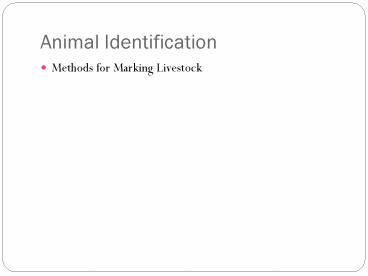Animal Identification PowerPoint PPT Presentation
Title: Animal Identification
1
Animal Identification
- Methods for Marking Livestock
2
Methods of Animal Identification
- Permanent
- branding
- tattoos
- ear notches
- Temporary/Non-permanent
- ear tags
- leg or neck bands
- marking paint
3
Why Identify Individuals?
- Record Keeping
- vaccinations and medicines given
- production and breeding records
- Tracking Beyond the Farm
- if the animal becomes sick after the sale or the
carcass is contaminated, they can track it back
to the source
4
Lets Focus on the Universal Pig Ear Notching
System
- universal and permanent
- inexpensive, quick, and easy
- individual Identity for each animal
- other forms, such as ear tags, could cause
problems
5
When to Ear Notch?
- best when newborn (1 to 3 days old) or at least
less than one week old - heal quickly when young
Image from Nebraska-Lincoln Extension Service
6
How Do You Ear Notch?
- use a tool called an ear notcher
- makes a small v-shaped notch
- not too deep or too shallow (about 1/4 on young
pigs, 1/2 on older ones) - well-spaced not too close to the head or too
close together - apply disinfectant or antiseptic when finished
7
Pigs Right Ear(left if looking at the pig)
- this is the litter number
- all pigs in the same litter must have the same
notches in this ear
8
Pigs Left Ear(right if looking at the pig)
- this is the pig number
- each pig in the same litter must have different
notches in this ear
9
Reading the Notchesthere may be only 1 or 2
notches per location (location 81 can only have
one)add the notches together to determine the
number (for example 1 1 9 11)
10
Lets Practice!What is this pigs litter and pig
number?
11
This Pig is 28 - 6Litter 27 1 28Pig
3 3 6
PowerShow.com is a leading presentation sharing website. It has millions of presentations already uploaded and available with 1,000s more being uploaded by its users every day. Whatever your area of interest, here you’ll be able to find and view presentations you’ll love and possibly download. And, best of all, it is completely free and easy to use.
You might even have a presentation you’d like to share with others. If so, just upload it to PowerShow.com. We’ll convert it to an HTML5 slideshow that includes all the media types you’ve already added: audio, video, music, pictures, animations and transition effects. Then you can share it with your target audience as well as PowerShow.com’s millions of monthly visitors. And, again, it’s all free.
About the Developers
PowerShow.com is brought to you by CrystalGraphics, the award-winning developer and market-leading publisher of rich-media enhancement products for presentations. Our product offerings include millions of PowerPoint templates, diagrams, animated 3D characters and more.

